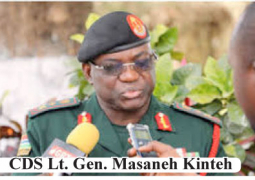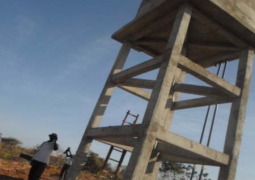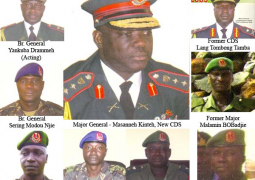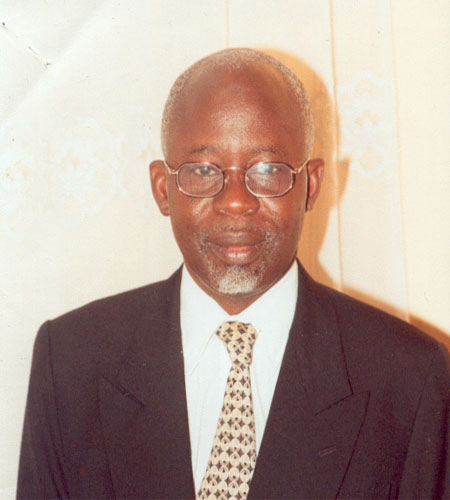
Lawyer Ousainou Darboe on Friday 19th February said the Constitution of The Gambia is on trial when he made a 'no case' to answer submission in the Femi Peters' case before Magistrate Kayode of the Kanifing Magistrates' Court.
In his submission, the defence counsel told the court that on the 28th October 2009, the IGP lodged at the Banjul Magistrates' Court a criminal charge containing two counts, that is, charging the accused person on those two counts.
He added that in his humble submission, the evidence that has been adduced in the case, particularly that of the fourth prosecution witness, shows the accused was not on trial. "It is the Constitution of The Gambia and the survival of democracy that are on trial," he told the court.
He argued that according to count one, the accused was charged with control of procession contrary to section 5 (5A) and holding a political rally. The accused was also charged with using a loudspeaker on count two, he noted.
Lawyer Darboe submitted that after the prosecution had called their witnesses, the defence considered that no prima facie evidence had been adduced by the prosecution to warrant the accused to enter his defence.
He further indicated that the criminal procedure code does not provide the criteria which could guide the court in this situation. He cited some law authorities to support his argument.
Senior defence counsel Darboe said that a no-case submission must be upheld when an essential element charged has not been proven or if the evidence has been so manisfested that no reasonable tribunal could convict on that.
"You must prove the commission of the offence. You must also prove that the person charged is the one who committed the offence. You must prove all," he argued.
He referred to the Oxford dictionary and Macmillan dictionary for the meaning of "procession." He went on to submit that the particulars of the offence in the charge sheet are different from the meaning of procession, according to the dictionaries referred to.
Lawyer Darboe then referred the court to the evidence of the first prosecution witness, who in his evidence told the court that he found the accused sitting down during the rally. "Where was the procession?" he asked.
He asserted that it was the UDP that was holding the rally, according to PW1, and not the accused. He further submitted that PW1 stated in his evidence that there was no procession, and that the accused did not hold the rally, but the UDP. "Why was the UDP not charged for holding the rally?" he asked. Darboe argued that the party does not need a permit to hold a rally.
Still making his submission, Lawyer Darboe submitted that the evidence of PW2 indicated that the accused was sitting at the podium and someone was speaking and that the accused was not talking to anyone, except when he responded to PW1 who spoke to him. "Where is the evidence of procession and the evidence of the rally held by the accused?" he asked.
According to him, the evidence of PW3 was virtually a narration of what PW1 and PW2 had said. He referred the court to the application by the UDP to hold a rally on the 24th October 2009 and at the back of the exhibit there was a minute that the application was not approved. He said the accused never applied for a permit, but it was the UDP that did so.
He submitted that there was not only evidence to support the statement of offence, but that the particulars of offence which must support the statement of offence was at variance with the offence charged. He argued that under the Public Order Act there is no provision to apply for a permit to hold a rally. He adduced that this is never the law, stating that there was no evidence that the accused has disobeyed or opposed any order.
"The IGP chooses to deny UDP a rally and allowed the APRC to go ahead with their rallies. The Constitution provided that all persons are equal before the law," he concluded.
In response to the defence no-case submission, Inspector Fadera, the prosecuting officer, stated that the accused was charged with control of procession. He read the charge sheet, and said that the prosecution called four witnesses and that the evidence of PW1 and PW2 corroborated.
Inspector Fadera stated that PW2 testified that there was a procession, and that there was a group of people escorting a car. Officer Fadera further submitted that this evidence had been corroborated by the evidence of PW3, arguing that all these witnesses were never shown any permit to hold the rally.
He further stated that PW4 told the court that there was an application by the UDP to hold a rally, and it was signed by the accused who went back to find out whether the application was approved.
The prosecutor argued that, according to the prosecution witnesses, there was a rally and the use of a public address system. According to him, the APRC was denied a permit and urged the court to term the witnesses of the prosecution as credible, citing some law authority in support of his argument.
Prosecutor Fadera went on to say that the court should not believe that the accused person did not hold a rally. He stated that a prima-facie case has been established by the prosecution, and urged the court to ask the accused to enter into his defence.
The case was adjourned to 3rd March 2010 for ruling.
Read Other Articles In Article (Archive)
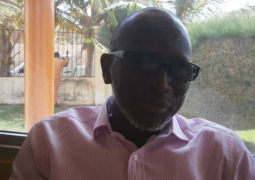
Seminar on export quality management sensitization wraps up
Feb 27, 2014, 11:04 AM
